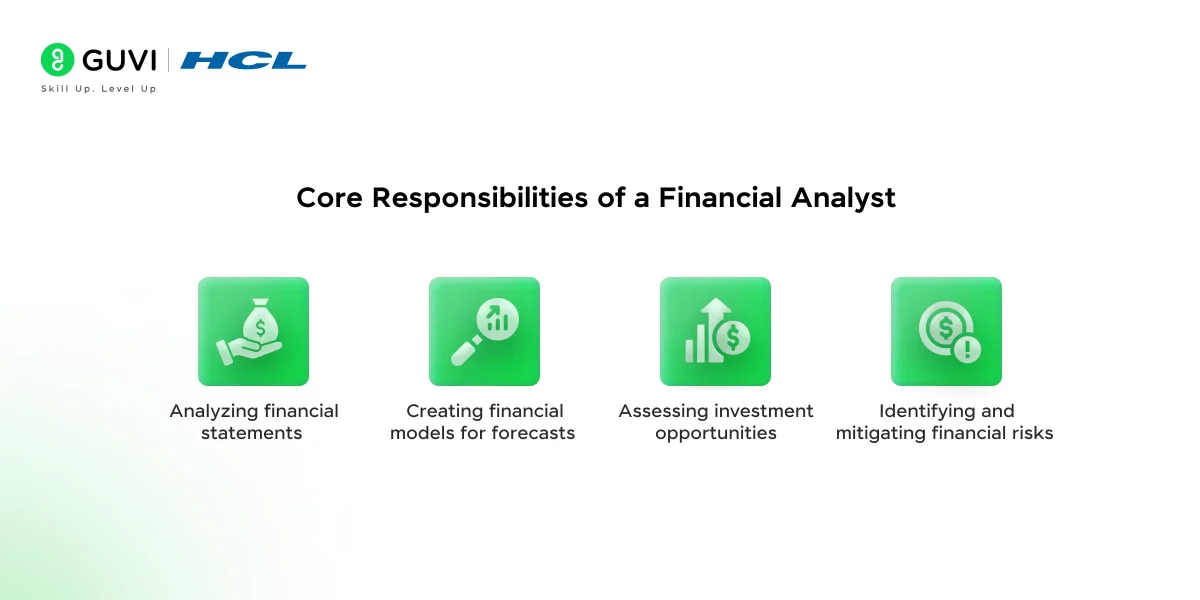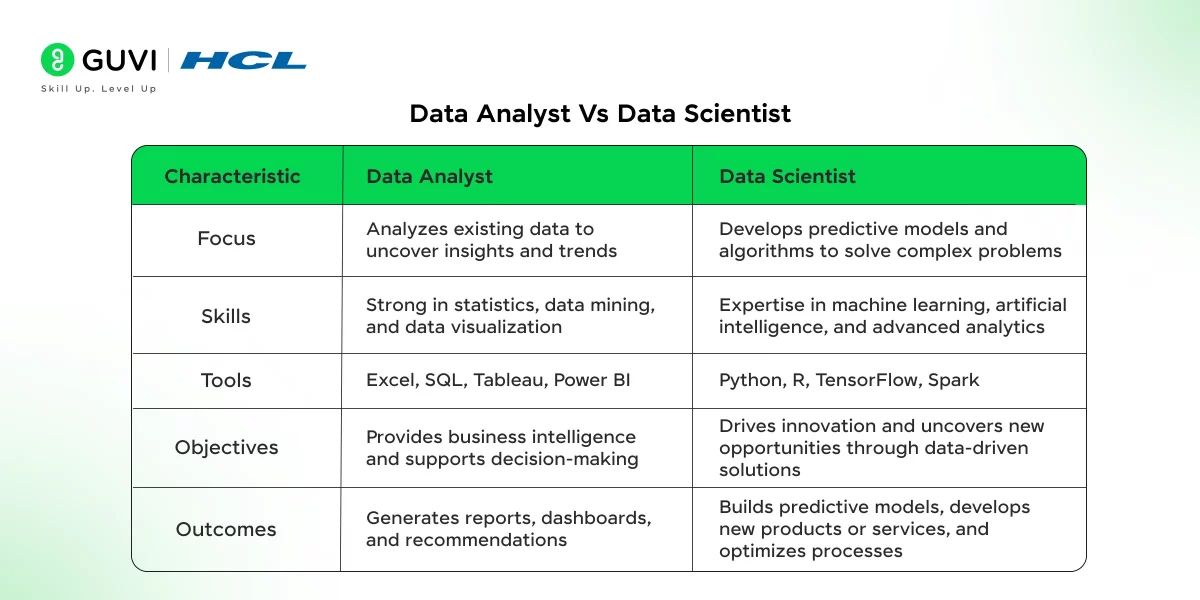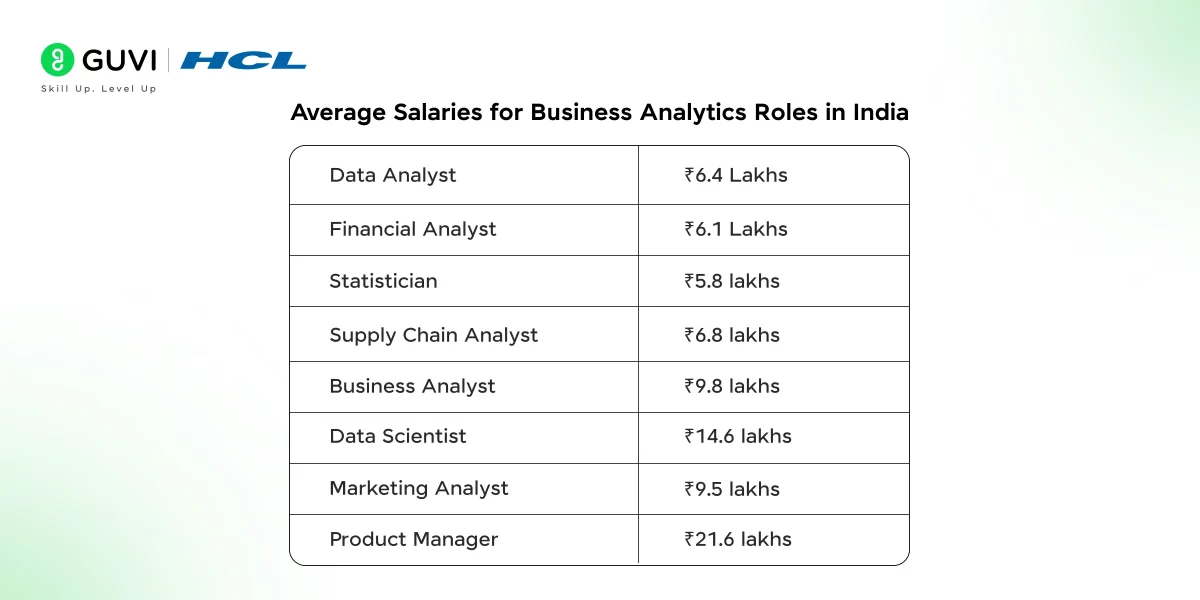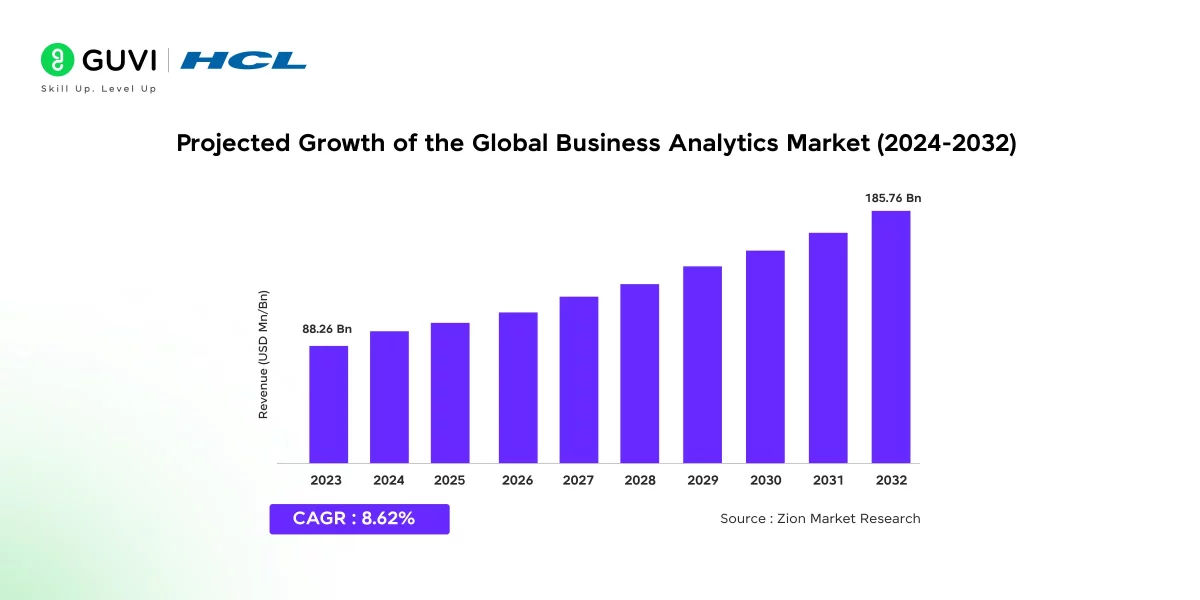
Top 8 Career Opportunities to Consider in Business Analytics
May 08, 2025 7 Min Read 2646 Views
(Last Updated)
From retailers and small businesses to large enterprises and healthcare organizations, business analytics has emerged as a powerful, indispensable tool for decision-making.
In today’s business landscape, solid data and insights always support clear and effective decisions. In a fast-paced world driven by technological advancements, relying on data isn’t just beneficial – it’s essential for success.
Businesses are no longer expected to simply sell; they must understand, engage with, and respond to their target audience, as consumer expectations are constantly evolving and far from linear. This dynamic landscape pushes businesses to stay agile, adaptable, and relevant. As a result, there is a growing demand for professionals skilled in business analytics – a field that helps companies navigate complexities, identify trends, and make confident, informed decisions.
This blog post will serve as a comprehensive guide to exploring the world of business analytics, providing you with a 360° view of the scope of business analytics and top career opportunities to consider in Business Analytics field.
Table of contents
- But first, what is Business Analytics?
- Why does Business Analytics play a crucial role in businesses?
- Top 8 Career Opportunities in Business Analytics
- Data Analyst
- Financial Analyst
- Statistician
- Supply Chain Analyst
- Business Analyst
- Data Scientist
- Marketing Analyst
- Product Manager
- Wrapping It All Together
- FAQ
But first, what is Business Analytics?
Business Analytics is a process where data is transformed into insights to solve business problems. Every business today generates a significant amount of data, and this historical data is leveraged to aid in decision-making and strategy for the future.
Key processes in business analytics include Data Collection, Data Mining, Sequence Identification, Text Mining, Forecasting, and more. Data is extracted through surveys, web scraping, database querying, and tracking digital interactions, allowing businesses to gather relevant information from various sources.
Most companies treat this data as a valuable asset, as it helps redefine business growth by uncovering trends, optimizing operations, and enhancing customer engagement.
Why does Business Analytics play a crucial role in businesses?
Every business wants to stay ahead of its competitors by all possible means, and business analytics gives them a strong edge.
Here’s how business analytics supports businesses in achieving their goals:
- Improved and informed decision-making
By analyzing past data, businesses can get a clear picture of what has worked and what hasn’t. This can save a business from multiple rounds of trial and error.
For example, a company can analyze the sales patterns of the previous quarters and years to improve future inventory planning.
- Identifying root causes
Analytics can help businesses to come up with a better disaster recovery plan. For example, a restaurant analyzes customer feedback and delves deep into it to understand the root cause of why sales dipped all of a sudden to improve customer experience and satisfaction.
- Predicting market changes
By studying historical data and patterns, businesses can anticipate what might happen next. For example, an FMCG startup can analyze the demand beforehand for specific products for the upcoming festive season or holiday season as this can help them meet the customer demand more effectively.
- Improving operational efficiency
Business analytics can help in improving processes, reducing costs, and increasing efficiency. For example, a manufacturing company can reduce operations costs using data to determine the most efficient production methods.
Top 8 Career Opportunities in Business Analytics
Data is the heart of every business, and analytics provide a solid foundation for businesses to make calculated risks and more strategic decisions. If you are looking to kickstart your career in business analytics, below is a list that will shed light on the different career opportunities business analytics can bring.
1. Data Analyst
The major role of a data analyst doesn’t just involve playing with numbers. It involves active contribution to the growth and success of the organization. As a Data Analyst, your primary responsibilities include collecting, processing, and performing statistical analyses to support the organization in making informed decisions and taking calculated risks.
Data Analysts are in high demand across diverse industries, from finance and business to healthcare, retail, e-commerce, and telecommunications, among many others. They serve as vital assets, helping organizations understand trends, uncover insights, and make data-backed choices that drive success.
To define the role of a Data Analyst in a nutshell, they are answerable to several essential questions within an organization. Here are a few examples:
- What are the current trends in our sales (or other key metrics)?
- Who are our top-performing customers, and what are their behaviors or preferences?
- Which products or services are performing well, and which are underperforming?
- Can we predict future demand or identify seasonal trends?
- Are there any potential risks we should be aware of?
- What is the customer churn rate, and why are customers leaving?
- What are our current customer demographics, and have they changed over time?
If you’re interested in a career in business analytics as a Data Analyst, here are a few essential skills and tools you’ll need:
1. A clear understanding of how to handle, clean, and organize raw data to ensure accuracy.
2. Ability to present data in a clear and accessible manner like charts, dashboards, and graphs
3. Ability to interpret and analyze complex datasets to identify trends and actionable insights.
Tools required as a data analyst – Microsoft Excel, SQL, Power BI, Python, Tableau, etc
Mastering these skills and tools will enable you to translate data into meaningful insights that drive strategic decisions, making you a valuable asset to any organization.
The average salary of a Data Analyst in India starts from ₹6.4lakhs per annum.
2. Financial Analyst
Financial analysts play a vital role in managing an organization’s financial health, directly impacting its long-term growth and profitability. By providing insights into financial performance and market trends, they shape the organization’s financial strategy and help ensure that it remains competitive and resilient.
These professionals work with financial statements to analyze past performance, forecast future trends, and maximize profitability by identifying investment opportunities. They transform raw financial data into digestible reports that stakeholders can easily understand and use to make informed decisions.
Core Responsibilities of a Financial Analyst
- Compiling, analyzing, and interpreting financial statements such as balance sheets, income statements, and cash flow reports, providing a clear picture of the organization’s financial health.
- Creating financial models to predict future performance by projecting revenues, costs, and cash flows, enabling strategic planning and effective budgeting.
- Assessing investment opportunities by continuously evaluating market trends, financial metrics, and risk factors to guide decisions on mergers, acquisitions, and capital investments.
- Identifying potential financial risks and developing mitigation strategies, helping the organization prepare for and manage unexpected downturns or market shifts.
The average salary for financial analysts starts from ₹6.1 lakhs per annum.

3. Statistician
Unlike analysts, statisticians bring a unique range of skill sets to the table, contributing rigorous statistical expertise that supports data-driven decisions, predictive modeling, and research within organizations.
Statisticians are essential not only in corporate settings but also in healthcare, pharmaceuticals, government, and research organizations, where data accuracy, hypothesis testing, and data-driven insights are critical to informed decision-making. Their role is fundamental for achieving accuracy and minimizing biases in data interpretation because they apply complex mathematical theories and statistical methodologies to collect, analyze, and interpret data across a broader range of fields.
Here’s a closer look at their primary responsibilities:
- Their main role is to ensure that the data extracted is unbiased and accurate.
- The tools they use mostly include statistical software such as R, SAS, or SPSS.
- Statisticians ensure data accuracy and reliability through model validation, hypothesis testing, and generating unbiased insights, collaborating on data quality to support precise analysis.
- They design surveys and experiments, breaking down complex data using advanced statistical methods.
Their insights go beyond surface-level trends, revealing hidden patterns, predicting outcomes, and validating assumptions.
The average salary of a Statistician in India starts from ₹5.8 lakhs per annum
4. Supply Chain Analyst
The company’s supply and consumer demand are similar to the wheels of a bike. They have to be balanced to ensure the entire ride is smooth. For a Supply Chain Analyst, expertise in business analytics plays a major role in this balancing act. Supply chain analysis isn’t limited to the inventory in the warehouse, as the analyst plays an important role in continuously assessing and improving the process.
What makes this a crucial role?
From receiving raw materials at the warehouse to ensuring the final product reaches the consumer, the Supply Chain Analyst is responsible for ensuring smooth operations at every stage of the supply chain.
- They begin by analyzing past patterns whether it’s increased demand during festivals, holidays, or a promotional discount campaign to predict future sales trends.
By studying sales data, customer behavior, and historical trends, the analyst gathers the insights needed to make informed decisions and keep the supply chain running optimally.
- The role also includes identifying any bottlenecks that could cause delays or inefficiencies in the system. Monitoring trends in sales and consumer behavior allows the analyst to anticipate changes in demand.
- Another crucial aspect of the job is tracking key performance indicators (KPIs) that evaluate the efficiency of the entire supply chain process.
In short, Supply Chain Analysts are the backbone of operational efficiency. They ensure that the entire process, from raw material procurement to final product delivery, runs smoothly and without interruption.
The average salary of a Supply Chain Analyst in India starts at ₹6.8 lakhs per annum.
5. Business Analyst
Instead of jumping straight into the roles, responsibilities, and skills required to become a business analyst, here is a quick overview of what a business analyst in an organization will bring to the table.
The Impact an Organization Will Have After Onboarding a Business Analyst
- Streamlined process
A Business analyst will bring in workflow, and improve operational efficiency which will lead to reduced costs and increased productivity across teams.
- Improved decision-making
With a strong expertise in data analytics and market research, business analysts would bring in a data-driven approach that provides actionable insights, allowing decision-makers to make informed choices. And they ensure that the company is moving in the right direction.
- Effective communication & collaboration
Business analysts would improve cross-functional communication and make sure the key stakeholders are on the same page in terms of goals, and objectives.
- Stronger Risk Management:
Their skills in risk analysis and forecasting would help anticipate potential challenges and risks, allowing the organization to take proactive steps to mitigate them and ensure business continuity.
- Faster Problem-Solving:
Unexpected hiccups would no longer interrupt productivity with business analysts in place. A business analyst’s role in identifying bottlenecks and weaknesses in processes would lead to quicker resolution of issues, reducing downtime, and improving workflow continuity.
In short, Business Analysts bring in structured and disciplined processes by constantly monitoring feedback, and results, and providing the organization with a better understanding of its operations, performance, and areas for improvement.
The average salary of Business Analysts in India starts from ₹9.8 lakhs per annum.
6. Data Scientist
Both Data Scientists and Data Analysts fall under the Business Analytics umbrella, yet Data Scientists are highly paid due to their advanced skills and specialized knowledge. While both roles work with data to generate insights, Data Scientists stand out for their ability to handle complex data sets and build predictive models that drive business strategies forward.
Unlike Data Analysts, who mainly focus on interpreting historical data to inform present-day decisions, Data Scientists take a broader, more technical approach. They often work with unstructured data, which can include images, text, audio, and video, alongside structured data.
A Data Scientist’s primary responsibility is not just analyzing data but also designing algorithms, creating predictive models, and utilizing machine learning techniques to forecast trends and behaviors. Their work involves deep technical knowledge in areas such as machine learning, artificial intelligence, and statistical modeling. They use programming languages like Python, R, and SQL, along with machine learning frameworks to develop models that can be applied to a wide range of business challenges.
The Average salary of Data Scientists in India starts from ₹14.6 lakhs per annum.

7. Marketing Analyst
Marketing analysts play a key role in enhancing marketing strategies by gathering, sorting, and interpreting data from multiple sources, such as surveys, social media, sales, and competitor performance. They synthesize this information to uncover patterns, predict future market trends, and recommend strategies to boost engagement, sales, and customer retention. The skills required for this role include statistical literacy, proficiency in market research, and effective communication. By combining technical knowledge with creativity, marketing analysts can develop actionable insights that drive business growth.
In the coming years, the demand for marketing analysts is expected to increase. Here are three reasons why:
- As businesses continue to rely more on data to shape their strategies, the need for skilled analysts who can interpret and act on that data will grow.
- With the rise of digital platforms and new marketing technologies, businesses will need experts who can analyze complex datasets to optimize campaigns.
- Understanding shifting consumer preferences and behavior is critical for businesses to stay relevant. Marketing analysts provide these insights, helping companies adapt and thrive in a competitive market.
The Average salary for Marketing Analysts in India starts from ₹9.5 lakhs per annum.
8. Product Manager
A product manager’s role goes beyond just overseeing a product’s development; it’s about shaping its entire lifecycle, from concept through to launch and beyond.
This role is pivotal for businesses seeking to stay competitive, as it blends creativity, strategy, and data analysis to drive a product’s success. A product manager is responsible for defining the vision and strategy for a product or service, ensuring that it aligns with both market demands and company objectives. They work closely with various teams from development to marketing to guide the product through each stage of its lifecycle.
Why does it make a great career opportunity?
- Companies use data analytics to shape product strategies. Product managers with strong analytical skills are crucial in making data-informed decisions that drive product success.
- As technology evolves, product managers are needed to integrate innovations, ensuring products remain competitive and adapt to complex, ever-changing ecosystems.
- Product managers bridge business goals and product development, guiding teams and driving product success, offering significant leadership opportunities and impact within organizations.
The average salary of Product Managers in India starts from ₹21.6 lakhs per annum.

Wrapping It All Together
Utilizing data the right way can give a brand a great edge over its competitors. According to a survey by KPMG, only 17% of organizations are extremely effective at maximizing the value of the data they hold, which means that the rest are simply leaving money on the table.
This also means that despite brands’ great understanding of the value data holds, they are unaware of the ways they can utilize it, and that’s where skilled analysts and data scientists come into the picture. Between 2020 and 2030, analyst jobs such as Market research analysts and financial analysts are projected to grow by 22% and 6%, respectively.
If you are still on the fence about choosing a career in Business Analytics and wondering if there are enough job opportunities for business analytics, this blog post is a sign for you to jump in and kick-start your career in Business Analytics. And if you are feeling overwhelmed with a sea of information available on Business Analytics, and feel clueless about where to actually begin your journey – GUVI’s Business Analytics Course is the right place for you.

FAQ
- Is business analytics a good career option?
Yes, business analytics is a promising career, offering high demand, diverse job opportunities, and the ability to influence key business decisions through data-driven insights.
- Are business analysts in demand?
Yes, business analysts are highly sought after across industries as companies increasingly rely on data-driven insights to improve processes, efficiency, and decision-making.
- Is business analytics a high-paying career option?
Yes, business analytics offers high-paying roles, with salaries typically rising due to the growing demand for professionals who can interpret data and drive business strategy.
- Is business analytics a hard major?
Business analytics can be challenging due to its combination of technical, analytical, and business skills, but with dedication, it provides valuable expertise for career growth.































Did you enjoy this article?